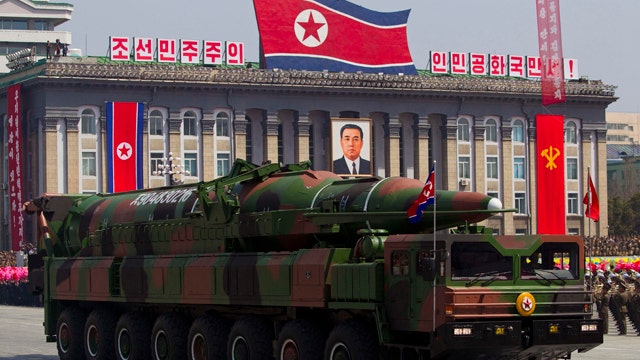Pyongyang: Korean peninsula is 'close to thermonuclear war'
Jennifer Griffin reports from the Pentagon
The top U.S. military commander in the Pacific on Tuesday defended the decision to delay a key missile test, saying the U.S. has already demonstrated its capabilities to North Korea and suggesting there's no need to further inflame tensions with an "unpredictable" leader.
Adm. Samuel Locklear, commander of U.S. Pacific Command, stressed that the U.S. has a "credible ability" to intercept any missile launch from North Korea -- as the regime reportedly prepares for a launch as early as Wednesday.
But Locklear voiced concern that North Korea's new leader Kim Jong Un is "more unpredictable" than his late father Kim Jong Il. "His father and his grandfather always figured into their provocation cycle an off-ramp of how to get out of it," he said. "And it's not clear to me he has thought through how to get out of it."
Locklear was questioned earlier Tuesday on the delay of an intercontinental ballistic missile test by Senate Armed Services Committee Chairman Sen. Carl Levin, D-Mich., at a Capitol Hill hearing. Levin said he was "puzzled" by the move to put off the long-scheduled test. The decision to do so was confirmed over the weekend by military officials.
Locklear, though, stressed that the U.S. has already amply demonstrated its military capabilities to its allies in the region and suggested another test could make things worse.
"I do agree with the decision," Locklear said at Tuesday's hearing on Capitol Hill. "We have demonstrated to the people of the region. We've demonstrated hopefully to the leadership of North Korea. We've demonstrated to our own people back here our ability and our willingness to defend our nation, and to defend our forward-deployed forces."
Locklear repeatedly assured lawmakers that the U.S. military and its allies are prepared in the event of an escalation with North Korea.
"I am satisfied that we're ready today," he said.
The testimony comes amid new reports that North Korea is preparing for a mid-range missile launch. Asked by Sen. John McCain, R-Ariz., if the U.S. has the capability to intercept a missile launched in the next few days, Locklear said: "We do."
Locklear said a missile launch at this point would not put "the homeland" at risk, but could potentially put Guam at risk. He reiterated that the U.S. has the capability to protect Guam.
The U.S. has moved two of the Navy's missile-defense ships closer to the Korean peninsula, and a land-based system is being deployed to the Pacific territory of Guam. The U.S. also called attention to the annual U.S.-South Korean military exercise that included a practice run over South Korea by B-2 stealth bombers.
Locklear, though, expressed concern that South Korea's capital of Seoul remains "at risk" by the North Korea artillery that could be directed at the city in the event of a military conflict.
The commander said North Korea's pursuit of nuclear weapons and long-range ballistic missiles represents a clear and direct threat to the United States and its allies in the region.
Locklear also said North Korea is keeping a large percentage of its combat forces along the demilitarized zone with South Korea, a position that allows North Korea to threaten U.S. and South Korean civilian and military personnel.
"The continued advancement of the North's nuclear and missile programs, its conventional force posture, and its willingness to resort to asymmetric actions as a tool of coercive diplomacy creates an environment marked by the potential for miscalculation that, and controlled escalation, could result from another North Korean provocative action," Locklear told the panel.
Increasingly bellicose rhetoric has come from Pyongyang and its leader, with North Korea urging foreign companies and tourists to leave South Korea and warning that the countries are on the verge of a nuclear war.
Levin told Locklear that the North Korean regime's threats "appear to exceed its capabilities, and its use of what capabilities it has against the U.S. or our allies seems highly unlikely and would be completely contrary to the regime's primary goal of survival.
"Nonetheless, its words and actions are not without consequences," Levin said.
The Associated Press contributed to this report.





